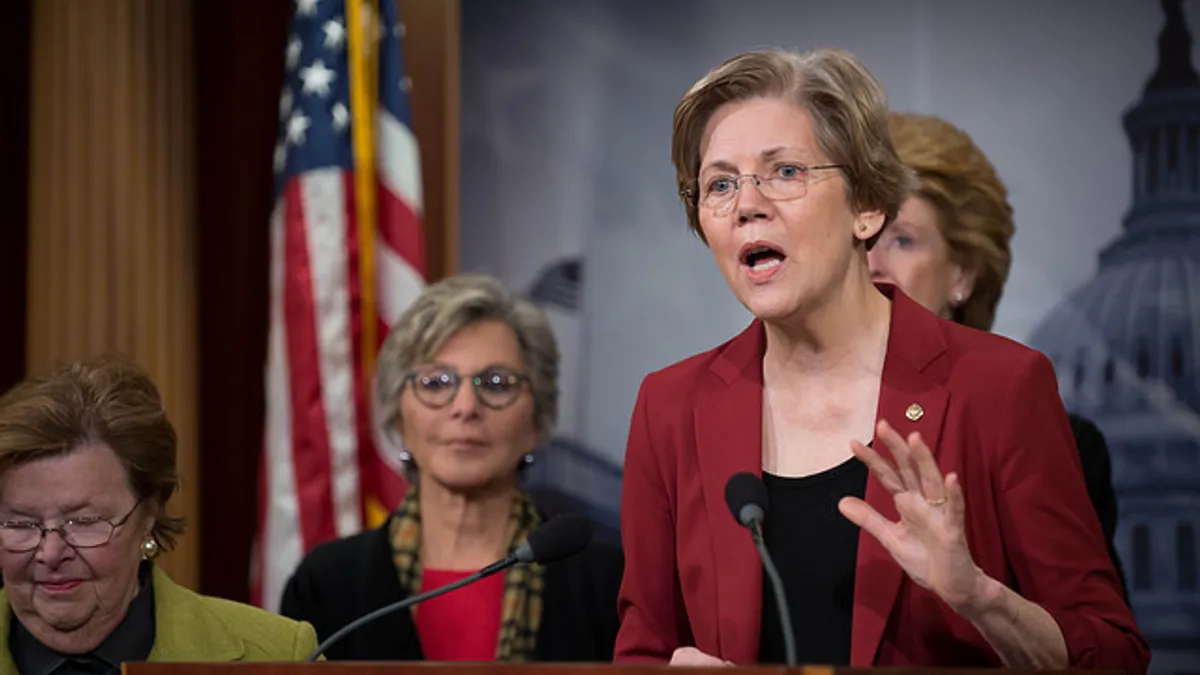The 2020 presidential election is more than a year away, but several Democrats vying for their party's nomination have already staked out their positions on key higher education issues.
Several initiatives have emerged as Democratic priorities: some version of free college, simplifying the FAFSA and expanding funding for colleges and universities. However, the details vary widely among the proposals put forth by the 19 candidates, as of publication time, in the primary race.
To help make sense of it all, we're rounding up what some of the top candidates have proposed so far, and what higher education experts have to say about their plans.
Free college
Joe Biden made headlines Tuesday when he unveiled his platform on higher education. His main goal is to make community college free for up to two years to help students transfer to a four-year institution or directly enter the workforce with a credential for less money.
The plan, which is similar to a proposal put forth by former President Barack Obama in 2015, would be paid for by closing tax loopholes and capping deductions for the most wealthy Americans. In Biden’s new proposal, the federal government would contribute three-fourths of the funding while the states would cover the rest.
Unlike many state free college plans, adult and part-time students would be able to participate. Moreover, it is a first-dollar program, meaning community college students would be able to reserve other forms of aid, such as Pell Grants, for nontuition costs like housing and transportation.
His plan would also double the maximum Pell Grant amount, which has won praise.
"(For) low-income students at a community college, especially at a high-cost-of-living location, doubling that amount will make a difference for them," said Wesley Whistle, a senior advisor for education policy and strategy with the Education Policy program at New America, a left-leaning think tank.
"You could just go and write states a check so they don't charge tuition anymore, but you'd be bailing out the low-spending states and kind of screwing over all the states that are already doing a pretty good job of making college affordable."

Matthew Chingos
Vice president of education data and policy, Urban Institute
Yet some policy and higher education experts have concerns with free college plans that are limited to two-year institutions, which tend to have low graduation rates. And recent research from The Brookings Institution, a right-leaning think tank, that simulated free college policies found free tuition at two-year institutions increases the percentage of students with an associate degree while reducing the number with a bachelor’s degree.
Biden's plan isn't as ambitious as that of his two top competitors in the race, Sen. Elizabeth Warren, D-Mass., and Sen. Bernie Sanders, I-Vt., who both proposed extending free college to four-year universities.
Their plans are similar, though Sanders has provided more details. Under his proposal, which he introduced in June, the federal government would front two-thirds of the cost of making tuition free, while the states would be on the hook for the rest. Warren, meanwhile, has only said her plan splits the cost between the federal government and the states.
Critics have been swift to pounce, arguing that such policies would benefit more affluent students the most and reward states that invest the least in higher education.
None of the free college plans address the latter issue, Matthew Chingos, vice president of education data and policy at the Urban Institute, told Education Dive in an interview.
"You could just go and write states a check so they don't charge tuition anymore," he said, "but you'd be bailing out the low-spending states and kind of screwing over all the states that are already doing a pretty good job of making college affordable."
Lawmakers will need to design such policies in a way that the federal portion of the funding is "supplementing, not supplanting," state support, New America’s Whistle said. That could prove especially tricky during an economic downturn, when higher education budgets could get slashed.
Student outcomes are also vital. "Free isn't the only thing that matters," he said. "Quality matters, too."
To that end, Biden's plan would give grants to colleges undergoing reforms that have been proven to increase retention and completion. And Warren has proposed giving more federal funding to states that improve the outcomes of low-income and racial minority students.
While other Democratic candidates have voiced support for free college, including Sen. Cory Booker, D-N.J., some in the field are opposed.
Sen. Amy Klobuchar, D-Minn., for example, said during a town hall earlier this year that she was against free college for all, instead advocating for an expansion of Pell Grants. Likewise, South Bend, Indiana, Mayor Pete Buttigieg has argued that low-income Americans shouldn't have to subsidize education for college students, who typically earn more after graduation.
Debt relief
Earlier this year, Warren dropped one of the most ambitious plans yet to eliminate student debt. Under her plan, which was proposed as bicameral legislation, students with incomes under $250,000 could be eligible to have some or all of their debt forgiven. Any remaining loan balances could be refinanced.
She estimates her plan will cost about $640 billion, which she intends to pay for by placing a 2% to 3% tax on households worth at least $50 million. The Brookings Institution found in a recent analysis that Warren's plan would mostly benefit middle- and high-income households.
Even so, her plan didn't go as far as Sanders' proposal, which he says would eliminate all $1.6 trillion in student debt. The senator's plan would pay for the initiative by taxing stock, bond and derivative trades, which would raise an estimated $2.4 trillion in the next decade.
Such plans may only be a temporary fix if they aren't coupled with policies that prevent student loan levels from rising again, Chingos said. Warren's campaign officials told The New York Times earlier this year that free public college would also drive down prices at private colleges, leading to lower student debt levels.
"What I've been critical of is having plans that aren't consistent, backward- and forward-looking," Chingos said. "It would be consistent to say, let's forgive all the debt because people shouldn't have to borrow to go to college and going forward, let's make it free and end the student loan program."
Whistle voiced similar concerns, particularly with Sanders' plan. "It doesn't make sense to me because [it] eliminates debt one day, but then literally the next day students could borrow under the same loan program."
"Free isn't the only thing that matters. Quality matters, too."

Wesley Whistle
Senior advisor for education policy and strategy, New America
Speaking about debt-cancellation broadly, Reid Setzer, director of government affairs at The Education Trust, told Education Dive that good policies are those designed to target students who are struggling the most to repay their loans. He listed students who attended predatory for-profit colleges and students who didn't finish their degrees as examples.
It's also important to consider the racial wealth gap when designing such policies, Setzer said.
"Someone who may have a lower income but has family support is in a different financial circumstance than somebody who may be making more money, but they're actually giving money to their family, they're supporting their parents," he said.
Other candidates have taken a more moderate approach. Sen. Kamala Harris, D-Calif., for example, said she supports lower interest rates for those with student debt, though she has backed free college in the past. And Biden proposed capping income-based repayment for student loans at 5% of discretionary income. Like some other plans, it's been slammed for benefiting students who are more financially well off.
In all, policy experts told Education Dive that such proposals should focus on underserved students.
"If you designed [them] … to prioritize those who are having the most trouble, and have historically been denied access, you're going to have a comprehensive overhaul that across the board lessens those racial and socioeconomic equity gaps," Setzer said.



















